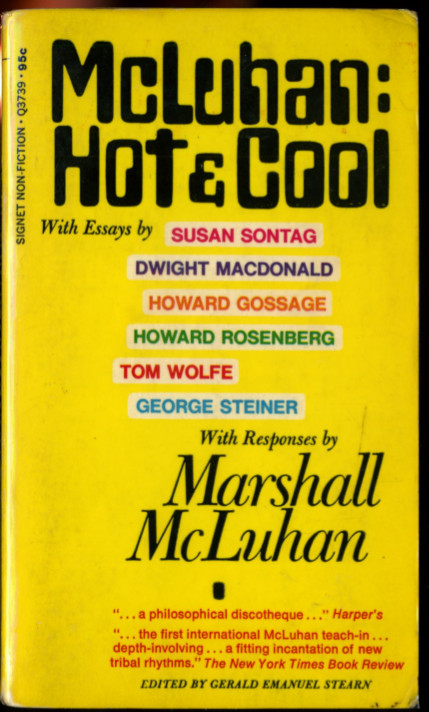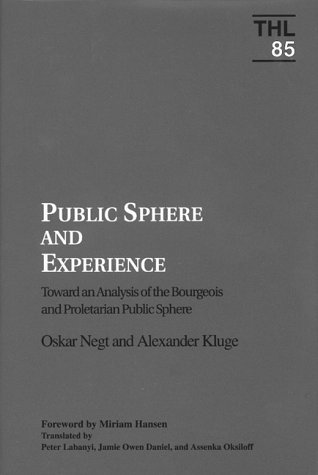Gerald Emanuel Stearn (ed.): McLuhan: Hot & Cool: A Primer for the Understanding of & a Critical Symposium with a Rebuttal by McLuhan (1967)
Filed under book | Tags: · global village, information, literacy, mass media, media theory, photography, print, radio, semiotics, speech, technology, television, text, writing

“A brilliant amalgam of articles, discussions, essays and interviews with and about the Pop Oracle himself, The Complete McLuhan: the most controversial thinker of the electronic age.” (from the back cover)
With essays by Howard Luck Gossage, Tom Wolfe, John Culkin, SJ., Dean Walker, Kenneth E. Boulding, George P. Elliott, Rudolph E. Morris, Walter Ong, SJ., Ammunition (C.I.O.), William Blissett, Harley Parker, Robert Shafer, John Freund, Patrick D. Hazard, Dell Hymes, Frank Kermode, A. Alvarez, Dan M. Davin, Raymond Williams, Harold Rosenberg, Dwight Macdonald, Christopher Ricks, Jack Behar, Ben Lieberman, John M. Johansen, George Steiner, Jonathan Miller, Andrew Forge, Benjamin DeMott, Susan Sontag; responses by Marshall McLuhan; and an interview by Gerald E. Stearn with McLuhan.
Publisher The Dial Press, New York, 1967
Signet Non-Fiction series, Q3739
312 pages
PDF (no OCR)
Comment (1)Oskar Negt, Alexander Kluge: Public Sphere and Experience: Toward an Analysis of the Bourgeois and Proletarian Public Sphere (1972–)
Filed under book | Tags: · capitalism, mass media, politics, proletariat, public sphere, technology, television

“The ‘public sphere’ is widely debated in contemporary literary and cultural studies circles in the United States. The topic’s significance underscores the pressing problem of the location of these contemporary debates: Is the ‘public sphere’ a single authoritative and universal space in which the various positions in these debates compete for recognition, or does it consist of multiple local spaces spread over diverse collectivities? The term ‘public’ has emerged with new urgency in different disciplines and contexts history, cinema and television studies, art criticism, feminist, gay and lesbian, postcolonial, and subaltern perspectives, and is proliferating in titles of books, articles, and college courses. Public Sphere and Experience opens the discussion of the material conditions of experience into an arena that had previously figured only as an abstract term: the media of mass and consumer culture, in particular the so-called new media.”
Originally published as Öffentlichkeit und Erfahrung: Zur Organisationsanalyse von bürgerlicher und proletarischer Öffentlichkeit, 1972, Suhrkamp Verlag, Frankfurt
Translated by Peter Labanyi, Jamie Owen Daniel, and Assenka Oksiloff
Foreword by Miriam Hansen
Publisher University of Minnesota Press, 1993
Theory and History of Literature series, 85
ISBN 0816620318, 9780816620319
305 pages
PDF (7 MB)
Comment (1)Adam Kotsko: Why We Love Sociopaths: A Guide to Late Capitalist Television (2012)
Filed under book | Tags: · mass media, philosophy, popular culture, television

“Argues that our fascination with cold and ruthless television characters reflects a broken social contract.
Sociopaths are pervasive in contemporary television, from high-brow drama all the way down to cartoons — and of course the news as well. From the scheming Eric Cartman of South Park to the seductive imposter Don Draper of Mad Men, cold and ruthless characters captivate us, making us wish that we could be so effective and successful. Yet why should we admire characters who get ahead by being amoral and uncaring? In his follow-up to Awkwardness, Adam Kotsko argues that the popularity of the ruthless sociopath reflects our dissatisfaction with a failed social contract, showing that we believe that the world rewards the evil and uncaring rather than the good. By analyzing characters like the serial killer star of Dexter and the cynical Dr. House, Kotsko shows that the fantasy of the sociopath distracts us from our real problems — but that we still might benefit from being a little more sociopathic.”
Publisher Zero Books, 2012
ISBN 178099091X, 9781780990910
107 pages
review (Siobhan McKeown, The Quietus)
review (Steven Poole, The Guardian)

